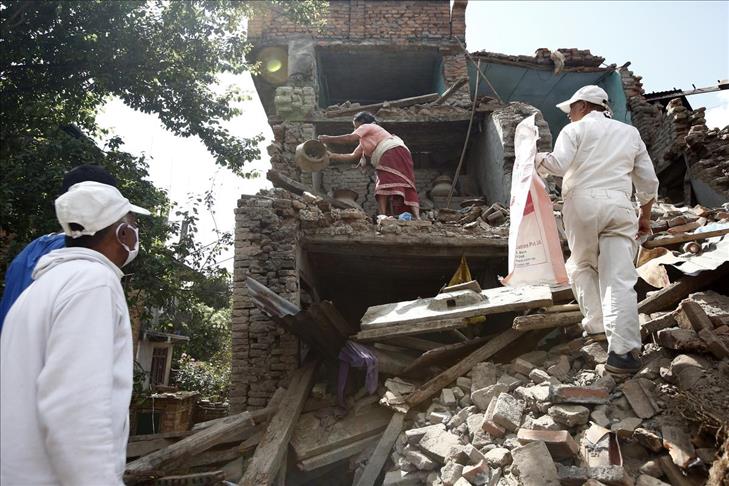
By Deepak Adhikari and Kaamil Ahmed
KATHMANDU, Nepal
The number of the dead in the aftermath of Nepal's devastating earthquake has risen to 7,056 as rescuers continue to find more bodies.
More than 14,000 were injured according to figures from the Nepali police, while the home minsitry estimated that more than 160,000 houses have been completely destroyed.
The EU ambassador to Nepal Rensje Teerink told reporters on Friday that 1,000 Europeans are still missing.
France's foreign ministry spokesperson Romain Nadal also confirmed in a statement that there were more than 150 French citizens missing.
"2,221 of our compatriots have been located to date, but we are still without news of 159 others, we are actively looking for them," said Nadal. "Yesterday, two flights of our embassy helped recover some thirty of our compatriots who were stuck in isolated areas."
As search and rescue operations wind down, the U.N. has called for a stronger international relief effort.
Valerie Amos, the UN head for aid and crisis management, praised current aid efforts “but I am also conscious of the urgent need to provide emergency shelter and basic goods and services to people affected as the monsoon season rapidly approaches. So many people have lost everything.”
The U.N. has made a $415 million appeal and has recognized that there is frustration among Nepalis, especially in remote areas, who have not yet received aid.
Pravin Shrestha, 20, a storekeeper at a Kathmandu hospital who drove for three hours back to his home in the badly-hit Sindhupalchok district, said his neighbours have no food and no shelter.
"We don’t have anything to eat. More than a dozen families including ours have been living under a plastic shack," he told The Anadolu Agency.
Frustrated by slow aid delivery and fearing the spread of disease in the quake's aftermath, hundreds of thousands of frustrated Nepalis have fled capital Kathmandu for less affected home districts.
Nepali government officials have repeatedly called for more international relief agencies to be deployed to remote areas.
The World Health Organization, which has been coordinating medical relief efforts, is concerned that some smaller medical teams arriving in Nepal without the necessary resources could actually become a burden on the health response.
"Unfortunately, they do not have the sustainability to be able to deploy into the remote areas where we need them the most," said Dr. Ian Norton, who is coordinating foreign medical teams, in a statement released Wednesday.
Still, Nepalis remain on edge since Saturday's magnitude-7.8 quake.
Saturday's quake -- the worst to hit the Himalayan nation since 1934 -- destroyed buildings, ripped up roads and set off avalanches in the Himalayas, including one which tore through the Mount Everest base camp, killing at least 18 people.
Several historic temples have collapsed, including the Kathmandu Valley's three iconic Durbar Squares -- palatial plazas from the historic Newari kingdom. The 62-meter tall 19th century Dharahara tower in central Kathmandu, was also brought crashing down by the quake.
An additional 72 people were also killed in India, according to India's home secretary L.C. Govak. Chinese state media reported 25 deaths in Tibet.
International response
The international community has pledged millions of dollars of aid to Nepal; numerous governments, including regional neighbors China, India and Pakistan have sent search-and-rescue teams.
Turkey has also contributed to search-and-rescue efforts under the Prime Ministry's Disaster and Emergency Management Authority, known as AFAD.
On Wednesday, AFAD supplemented earlier contributions by sending 16 tons of supplies including tents for the displaced, food, water and supplies for children.
Immediately after the quake, the Turkish authority had sent a 96-member search and rescue team along with 1,000 tents and 320 food packages.
Several other Turkish agencies -- including the Humanitarian Aid Foundation, Turkish Red Crescent, Search and Rescue Foundation and Confederation of Public Servants Trade Unions -- have sent emergency and medical supplies, doctors and search and rescue experts.
*Kaamil Ahmed contributed from Dhaka, Hajer M'Tiri from Paris
Anadolu Agency website contains only a portion of the news stories offered to subscribers in the AA News Broadcasting System (HAS), and in summarized form. Please contact us for subscription options.






